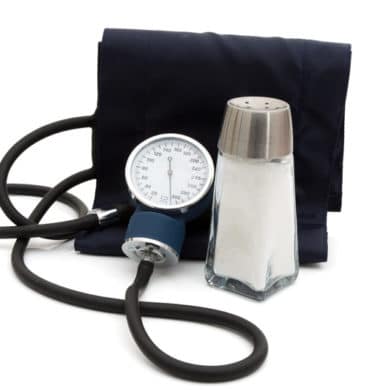Too Much Sodium?

Confused by the New York Times article that reported on findings from the Institute of Medicine (IOM) about low-sodium diets being harmful? Don’t be. The New York Times got it wrong. If you look at the actual IOM report, they found serious methodological flaws in all of the studies suggesting harm from low-sodium intakes.
All the key major health authorities — including the American Heart Association, National Institutes of Health, and the World Health Organization — have urged the public to cut back on salt to combat the global epidemic of elevated blood pressure, a major cause of heart attacks, strokes, congestive heart failure, and kidney disease. Worldwide, elevated blood pressure causes more preventable deaths than tobacco, obesity, alcohol, or any other cause, according to the World Health Organization. Two out of every three U.S. adults have either hypertension or prehypertension. It’s an epidemic. And eating too much salt raises blood pressure.
More than 97 percent of adults up to age 50 — and more than 95 percent of adults over 50 — consume more than 1,500 milligrams of sodium a day. 75 percent of women and 96 percent of men consume more than 2,300 mg a day
The IOM ignored the mountain of conclusive evidence that cutting sodium reduces blood pressure. The American Heart Association recommends “that all Americans eat no more than 1,500 mg a day of sodium.” There is good, solid research evidence that cutting sodium from current levels lowers the risk of heart attacks and strokes in people with prehypertension (that’s about one in three adults). A follow-up of the Trials of Hypertension Prevention was among the very few studies that had no flaws, according to the IOM. The follow-up found 25 to 30 percent fewer heart attacks, strokes, and other cardiovascular events in people who cut their sodium by 25 to 35 percent (from 3,556 mg a day down to 2,286 mg a day in one part of the study and from 4,207 mg down to about 3,229 mg in the second part).
Bottom line? Restrict your sodium intake for better heart health!
- Arrhythmia vs. Dysrhythmia - July 2, 2024
- Services Offered at Our Transitional Heart Failure Clinic - June 25, 2024
- South Denver Cardiology Offers Pulse Field Ablation to Treat Atrial Fibrillation - June 7, 2024
Sign Up
As with any health concerns, your specific treatment program should be discussed thoroughly with your primary care physician as well as any specialists who may need to be consulted – like a cardiologist.
Sign Up
